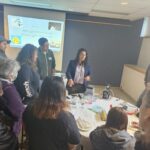-
October 7, 2024 - October 10, 2024
8:30 am - 3:00 pm
Location: Northern Manitoba Sector Council, 7 Selkirk Ave Unit # 101, Thompson, MB
Gain the essential core skills and comprehensive background knowledge needed to excel in environmental management and planning with MEIA’s EnviroEssentials Training Program. This program is specifically designed to equip participants with a deep understanding of environmental processes, regulations, and fundamental concepts relevant to Manitoba. Establish a solid base in environmental fundamentals with in-class training and hands-on instruction.
Who Should Attend?
This program is ideal for workers and professionals in mining, forestry, construction, land and water management, waste management, and municipal operations who seek to enhance their environmental expertise and compliance skills.
Program Details
Soil Sampling : Monday, Oct 7
This course will outline and help students classify soil, computation of mass/volume relationships,
defining basic groundwater terminology and developing and executing an environmental sampling
program. You will be able to classify a soil using the Unified and AASTHO methods, calculate basic
soil properties and perform fundamental groundwater flow calculations. You will be able to design
an environmental sampling program and use a variety of environmental sampling equipment. Students
will conduct a practical and conduct a soil sample, and a geological soil log.
Potable Water and Groundwater Sampling: Tuesday, Oct 8
Students will be given an overview of the typical groundwater contamination and impacts focusing on the differences between light and dense non-aqueous phase liquids (LNAPL and DNAPL). The course will include the theory behind groundwater well installation, groundwater development, and purging and sampling including groundwater well volume and recharge related calculations. Students will collect potable samples and test chlorine residual-total and free, and test for other toxic metals through electrical conductivity. Students will learn the Canadian drinking guidelines, chemical and physical parameters of water. They will further go over wastewater sampling, both Manitoba provincial regulations and federal.
Introduction to Environmental Science: Wednesday, Oct 9
Students will gain an overview of our impact on the environment, including an introduction to invasive species, climate change, and world views. The class will explore using science to address environmental problems; ecosystems associated with energy and the physical environment; and our precious resources: Water, wastewater, soil, land conservation, agriculture and their preservation.
Introduction to Environmental Law in Manitoba: Thursday, Oct 10
Students will be given an overview of environmental history, legislation, and economics, providing the larger context in which environmental law exists. The class will cover environmental regulations in Manitoba and the regulatory processes for each of these key laws. The discussion will include how your work interfaces with Environmental Law and knowing where to go for additional resources.
Registrants for this event are eligible to claim 16 PD credits towards maintaining their EP designation with ECO Canada.
About the Instructor

Raven Sharma is the Manager of Utilities for the City of Selkirk and an instructor for Red River College Polytechnic water and wastewater certification courses. She has a Bachelor of Science, Geological Science, and Bachelor of Arts degree from the University of Manitoba. She was a volunteer firefighter for 6 years and has recently been appointed to the board of directors and chair for the North American Society for Trenchless Technologies. Raven also sits on the Manitoba Water and Wastewater Association as a board of directors. Her passion is mentoring and teaching operators throughout Manitoba how to troubleshoot and deal with ongoing issues with climate change and aging infrastructure. Raven was part of a scientific research team who led rover simulations that would eventually go to Mars for NASA and the Canadian Space Agency in search of water and life.
